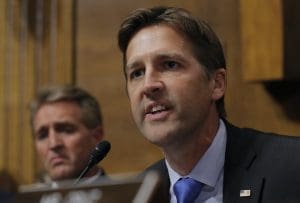GOP senators vote against paid sick leave after supporting Trump's border 'emergency'
Donald Trump’s wall was a big enough emergency to warrant their attention.

Eight Republican senators voted against a bipartisan emergency coronavirus appropriations bill on Wednesday. But six of those same senators had previously voted for Donald Trump’s border emergency declaration.
The 90-to-8 vote sent the Families First Coronavirus Response Act to Donald Trump. The bill will provide temporary paid sick leave for some workers, free coronavirus testing, and expanded Medicaid, food assistance and unemployment. Trump signed it Wednesday night.
Republican Sens. Marsha Blackburn of Tennessee, James Inhofe and James Lankford of Oklahoma, Ron Johnson of Wisconsin, Ben Sasse of Nebraska, Tim Scott of South Carolina each voted no.
But last March and September, all six voted to support Trump’s declaration of a “border emergency.”
“The current situation at the southern border presents a border security and humanitarian crisis that threatens core national security interests and constitutes a national emergency,” Trump declared last February. To address this, he announced he would siphon billions of dollars appropriated for defense to pay for a wall along the southern border.
Majorities in the House and Senate voted to reject this declaration, but all six voted to preserve it, effectively endorsing his move.
The senators did not immediately respond to inquiries about their votes.
Last week, Trump finally issued an emergency declaration over the coronavirus pandemic.
Published with permission of The American Independent Foundation.
Recommended

Ohio doctors fear effects of emergency abortion care case set to go before U.S. Supreme Court
A federal law that allows emergency departments to treat patients without regard to their ability to pay will be under U.S. Supreme Court scrutiny this week, and Ohio doctors are concerned about the case’s local impact on emergency abortion care.
By Susan Tebben, Ohio Capital Journal - April 23, 2024
House GOP votes to end flu, whooping cough vaccine rules for foster and adoptive families
A bill to eliminate flu and whooping cough vaccine requirements for adoptive and foster families caring for babies and medically fragile kids is heading to the governor’s desk.
By Anita Wadhwani, Tennessee Lookout - March 26, 2024
U.S. House Speaker Johnson says IVF should be protected — just not by Congress
U.S. House Speaker Mike Johnson said Thursday that it’s up to states and not Congress to preserve access to in vitro fertilization, weighing in on a growing national debate and campaign issue.
By Jennifer Shutt, States Newsroom - March 14, 2024








































































